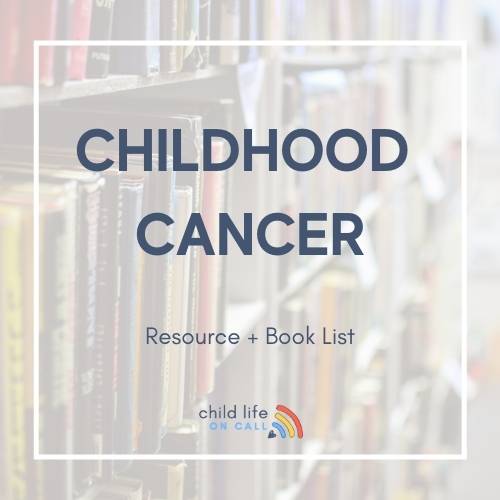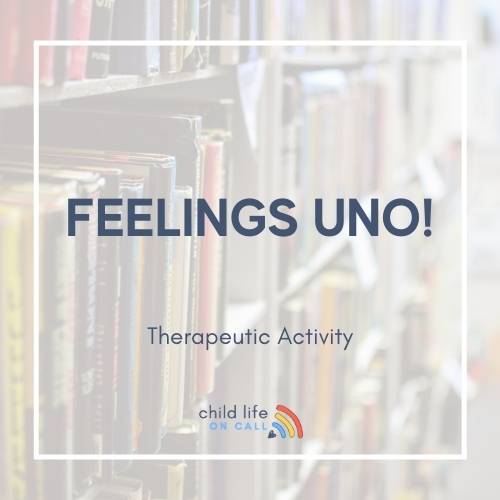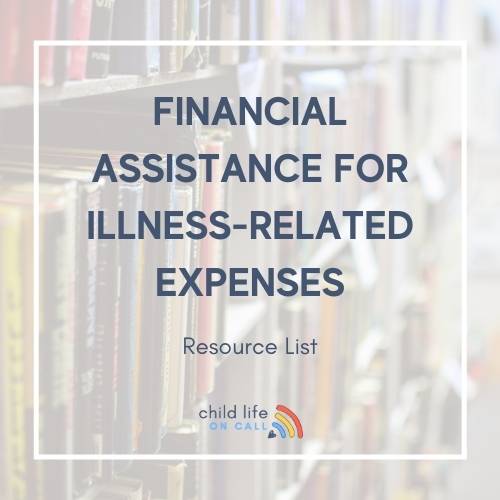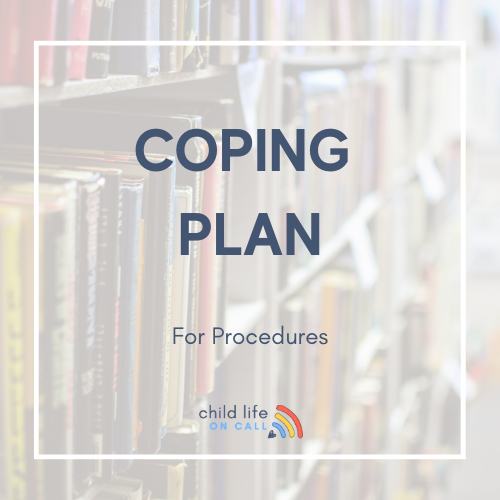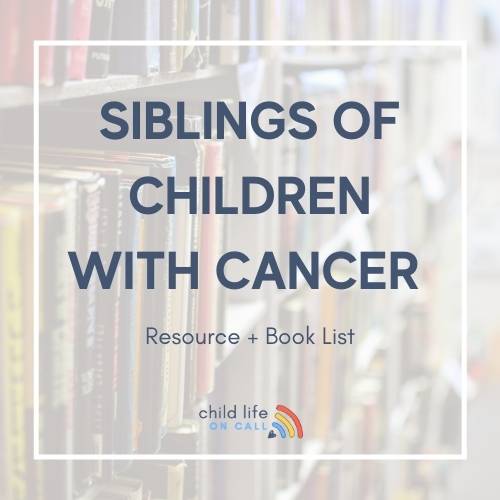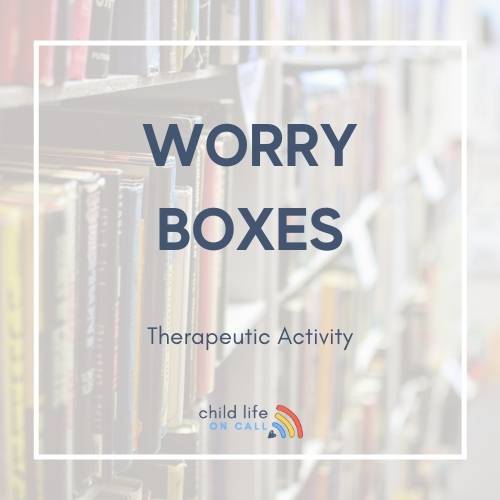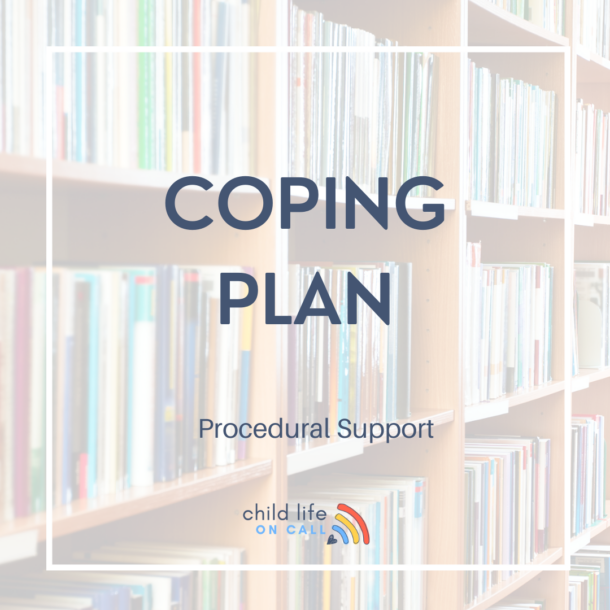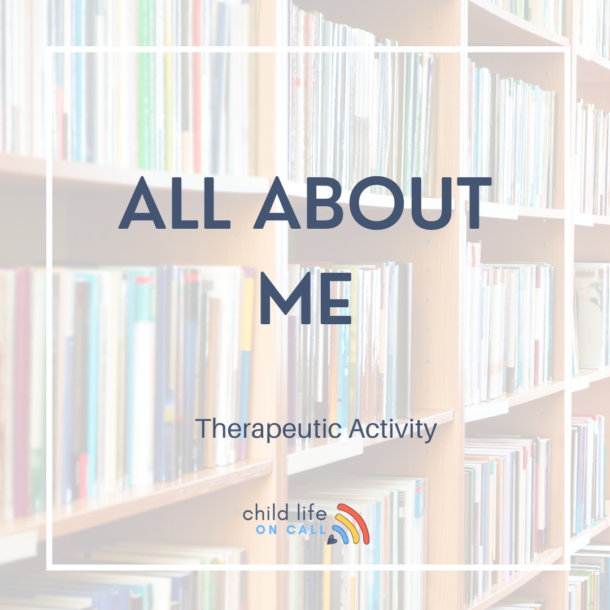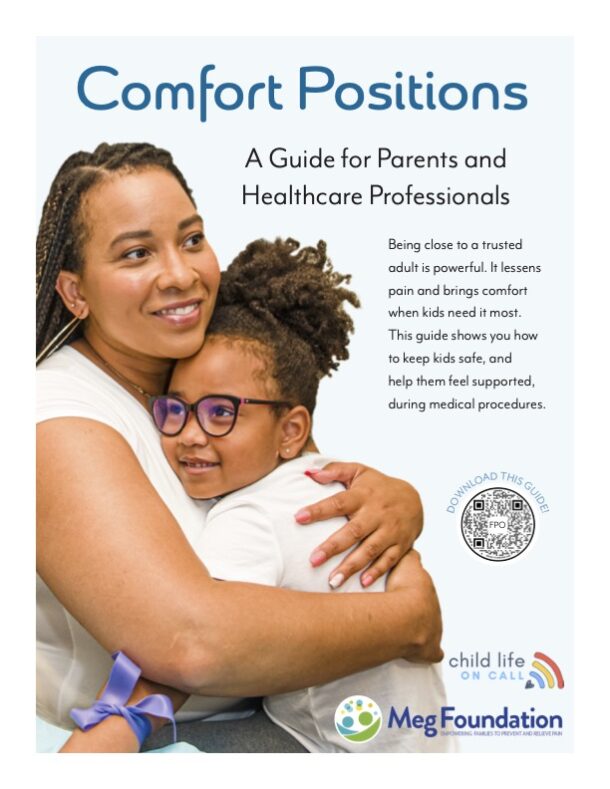The first sign of sniffles, or worse, shouldn’t send you into a tailspin. Feel confident in your role as a parent and advocate, no matter what medical situation you’re facing.
See a full transcript of Episode 196: Hannah Parson's Story below.
00:00:00 You’re listening to episode 196, Hannah’s story a Son with Vactrel Association. Hello, my friends. Welcome to Child Life On Call. This podcast is a safe place for parents to share their stories about what it’s like to have a child that has a medical experience, diagnosis, disease, and or everything in between. We know there is power in sharing stories, and power multiplies when you can listen to other parents who have walked a similar path to yours. 00:00:30 Giving and getting advice is great, but hearing how another parent navigates the complexities and nuances of healthcare is even better. As a child life specialist, my role is to support, validate, and provide emotionally safe spaces for kids and their families, and I am so honored to be on this journey with you. In addition to parent stories, we sprinkle in some expert episodes every now and again that have content for both parents and professionals in the field of healthcare, all with the mission to empower parents to be confident advocates and partners with the care team during healthcare experiences. We’re so glad you’re here. Hi friends. 00:01:08 It’s so great to be with you today. I’m going to keep this intro nice and short so we can get right to Hannah’s episode. But today we are talking about Hannah and her experience with giving birth to her son, who ended up having vactoral association. We have had one other mom share on this podcast. Ashlyn and her son also had vactor association. 00:01:29 So in my conversation today with Hannah, she has been on other podcasts before where she’s talked a lot about the pregnancy and the birth of her son. And today we really dive into those first two years of motherhood and navigating a new experience and transition into motherhood as well as medical motherhood. So I’m going to stop talking now so we can just jump right into Hannah’s episode. I’m so glad that you’re here. I’m Hannah Parsons and I live in Los Angeles with my husband and my two year old son, Obie. 00:02:05 And yeah, we we’ve been through a lot in the last two years. I spent the first half of my life being an actor and then kind of transitioned into more comedy stuff. And I lived in Chicago for a while, and then I got into editing and more stagecraft type stuff, doing lights and sound, and then I ended up here in La with my husband and with the pandemic and everything, pretty much fully transitioned into editing from home. Yeah. And the transition into motherhood, all the timing at the same time. 00:02:52 Oh, my goodness. Oh, that’s so cool. We have to talk more. I want to hear more about your past life as an actor and comedian. So exciting. 00:03:02 When I was little, my dream was to either be on the news so, like every home video from 1986, I’m like, signing off, or to be a comedian standing in front of the brick wall that was in my mind like what I wanted to be. Oh, wow. Yeah. I feel like those are actually not that far apart. They’re not. 00:03:23 I’m a Child Life On Call, you know, who. And so your son obie. I know. I’ve met you through other podcasters that I love, kara Riska with the special needs mom podcast, jessica Pate with we are brave together. And you’ve gotten to talk a lot about kind of your pregnancy and finding out what was happening with OB. 00:03:44 And I would love to hear know the birth and after was like in navigating these past two years for you as his mom. Sure. Yeah. So it was my first pregnancy and we didn’t have insurance and so we took like maybe longer than usual to get our first ultrasound. I think we were like 16 weeks or something. 00:04:13 And they came back with that. He was missing a bone in an arm, in his right arm. And that sort of set us on a trajectory of a totally abnormal pregnancy. We were seeing specialists constantly. We were going to all these follow ups and it didn’t really seem like there was a clear reason. 00:04:36 All the people that we were encountering were like, we’ve never seen this before. This is really weird. And I felt like I didn’t really want to pursue more testing because I really felt like I was going to keep him and I didn’t see the usefulness for me in knowing the exact thing that was going on with him. I understand more clearly now that that would have been more for the hospital staff to be prepared for what was coming. Right. 00:05:14 But I sort of got into this headspace of us versus them with the hospital because I felt like they just kept filling my head with, he could have this, he could have this, he could have this. And I just wanted to be like, no, he’s going to be fine. Like, guys, I can’t grow this baby with that mentality. That’s not how this works. It’s really stressful to be pregnant, and especially in a pandemic. 00:05:47 I really had to fight, fight, fight to keep a space around myself where me and my husband were holding like, he’s going to be fine. That’s just how it has to be. That way we’ll deal with whatever happens when he’s born then. But now it needs to be about obviously keeping him safe, keeping me safe. So that was my pregnancy and then he was born. 00:06:14 They had to induce me because he was desatting. They were monitoring his heart and they just were like, I’m so sorry, we have to so it was kind of a surprise, like, okay, at 37 weeks, let’s just get him out. So they got him out and thankfully there was a good NICU at the hospital we were at. And they were able to diagnose, they were able to notice that he was kind of foaming at the mouth and that they put a line down his esophagus, and it just curled up in a thing instead of going straight down to his stomach. Okay, so this esophagus is not attached to his stomach. 00:06:52 And so they took him away. They figured that out. Then they brought me to him. This was all pandemic, so it was like, me and then my husband got to go and beautiful and did the same thing. So I went in and they were like, so here’s what happened. 00:07:10 Are you functioning at this point? Are you able to understand what they’re telling you? Sort of. I’ve just been through a natural birth with no epidural and an induced birth, so it was very intense. And then I was sewed up, so I’m kind of like, anything’s better than what I just went through, so okay. 00:07:33 I hope he’s going to be fine. And I think the oxytocin, I was kind of high. Looking back, I’m like, I took some selfies in the hospital all like, hey, yeah. And I look back at those and I’m like, that does not really reflect what’s happening. Right. 00:07:54 How interesting. Yeah. I think I was very relieved to not be pregnant anymore. Yeah. And he was here. 00:08:05 Well, they whisked him away and then needed to take him to another hospital. So he was sort of out of my hands completely in a way that was initially very freeing because I was like, I’ve been holding this thing that has all this chaos connected to it, all this stress connected to it, and now it was outside of me. And not only that, but there were professionals dealing with it. Right. So I kind of felt this relief of, like, not all eyes are on me. 00:08:39 I’m not being poked and prodded. 00:08:46 But there was a moment in the hospital because I had to stay there for 24 hours before I could go to the hospital that Opie was transferred to for surgery. And after they told me what was going on with OB, I had this moment where I sat down on the bed and I was by myself, and it was while my husband was being told. And I had that moment where I kind of felt what it would feel like to lean into it’s all about to go wrong and like, I’m about to lose my baby. And then that felt really intense, and then I sort of took a breath and leaned away from that, and then my husband came in and I saw the look on his face, and I was like, oh, no, we cannot go there. We cannot go there. 00:09:44 So I just rallied and was like, no, we’re going to continue exactly what we’ve been doing the whole time, and he’s going to be fine, and that’s the way we have to. We’re his support team. We believe in him. We’re not going to lean into fear. 00:10:04 I felt like together we sort of went through that shift together where we kind of processed and then it was pretty much like we’re on the same page. He’s going to be fine for the rest of the journey. Yeah. Because what is the alternative? Just crumbling. 00:10:24 Yeah. Which is allowed and makes sense to crumble in that situation. Absolutely. So did your husband leave you to go see him in the NICU? Did you guys go together? 00:10:39 How did that work? Yes, he initially went that night and followed him to the hospital. And my brother came to stay with me because we were only allowed one person with us at a time. And then my know, got set up, met Obi’s nurse for the night, kind of got the lay of the land, like, okay, this is where we go, this is where we park, all that stuff. And then said goodbye to Obi and came back to the hostel to spend the night with me. 00:11:13 And then the next we as soon as we could check out, checked out and went to the hospital. And he walked me up to where his room was. And that was my first entry into that world. And it is a world as you know, it’s a different planet. I’ve had a nurse navigator I worked with for a long time. 00:11:47 She described it best to me, and she said, when families walk in here, it feels like you’re walking into a war zone, and at any minute bombs can go off and you can be shattered. And it is just so true of that 1st, 2nd, 3rd walk of fear and you don’t know what’s around you. Yes, that is a really good way to describe it. Yeah. And that brings it all back because each room, something different is happening. 00:12:24 You’re feeling the emotions coming out of each room, and every few seconds a kid’s being wheeled down the hall in an emergency fashion. And then there’s your connection to your own room. And we lived really close to the hospital, so we would go home every night and then come back early in the morning, as a lot of parents do. And so there would be this anxiety walking in because you didn’t know if you were going to walk in and it was going to be bad news. And then the second somebody said, oh, he had a great night, you’re like, okay. 00:13:09 Or these moments too, where you walk in and they’re like, and he’s not there. Oh, my God, that happened to us. They just move him across the hall, but you’re like and it may have just happened. They may have not even had a chance to tell you yet, but you’re always on guard for worst case. That truly I came up again, we were there for two and a half months, so I got a really good I experienced a lot of communication breakdown that caused unnecessary stress, man. 00:13:50 Just communication. And it’s something that it’s hard to in an organization because every hospital is different and it’s just human beings. We’re all doing our best. We’re all tired, we’re all overworked. 00:14:06 But then your kid comes back with the wrong kind of he was supposed to, at one point get an OG because he has very tiny nasal passageways, and the doctor had written on the chart, he needs an OG. And then he came back and he had an Ng. And I walked in and they had bagged him, and they were, like, trying to resuscitate him because he could not breathe. 00:14:42 And then at the end of the once they finally got him, they got it out of him, they had just had to yank it out because he was given up. At that point, breathing was more important than. 00:14:57 That’S, the order of breathe. 00:15:04 But I was in shock because I didn’t know what the heck happened. And we had talked to the doctor, and then she showed us what she’d written down, and she’s like, I’m so sorry. It was just I don’t know what that person read. I don’t know if they just made a judgment call that it would work better as an Ng than an OG, or they thought I had miswritten it or something, but somebody yeah, somewhere somewhere it got mixed up and then that happened. And I walked in on that and I experienced everyone trying to save his life in a moment where that was not necessary. 00:15:42 He had been fine. And it’s stuff like that that over time, you kind of lose your trust. For me, what I started doing was really getting a lot more proactive and getting a lot more just militant about interviewing everybody who came in and worked with him and making sure they knew my name and knew my number and knew to talk to me before they did anything and knew his history. And I was just really on top of it, and I was leaving notes. I was taping notes to his bed with necessary information. 00:16:25 But then I had to, at a certain point, remember that that wasn’t good for me either, that I needed to also trust people sometimes. Yeah. So Lindsay, who edits this podcast, she always reminds me, she’s like, Trust but know. And it’s a good way to look at it. It’s like, I trust you. 00:16:49 I’m going to verify. And I love the way she puts that, because it’s true. Like, you’re going to drive yourself mad just second guessing every little thing, but at the same time, you walked into a situation, and history tells you, I have to make sure this is done correctly. Otherwise it’s done. 00:17:11 Saw it. I saw it enough times. Weirdly. This was the real straw that broke the camel’s back was we had really developed a relationship with the team that was looking after Obi at this point. This was probably a month in or something, and we had talked to everybody because he had had blood clots because of his pick lines. 00:17:45 He’d had multiple pick lines in the same vein and gotten blood clots and, I mean, he’s a 4.5 pound baby, so they were doing their best, but he’s a tough one to keep going. Yeah. And then he had an IV in his arm, and that I think those go bad really fast. 00:18:09 So they’d talked about because he was on antibiotics for he had gotten pneumonia from not being able he was aspirating his milk. I guess I should probably cover that, but yeah, basically he had his esophagus repaired through surgery, and then we were trying to feed him through a bottle, but because he didn’t really get the practice swallowing, he was silently aspirating some of his milk into his lungs. And so he would get pneumonia, and then he would get antibiotics and he would recover from the pneumonia, and then we would try again, and then he would get pneumonia again. So it was always this, like, how do we keep this child fed? Because we were really trying to get him to grow so we could take him home. 00:18:55 But at this point, he still needed his antibiotics. He needed to finish his antibiotics. And he had, like, maybe four more days of antibiotics, and they were worried about the IV going bad. And so I think a pick line had been ordered and the last place that was available was his head. Yeah. 00:19:20 And we really were like, we don’t want that. We really don’t want a pick line in his head. Please, please. The ivy is still good. We talked to everybody. 00:19:31 The nurse knew that was going to be last resort, but I think somebody had ordered it, and because it’s a very special team that has to do that, and they’re only available certain times. Right. But we had talked it was like, before the weekend, so it was like a Friday. And we had talked to our day nurse. We talked to the doctors, everything. 00:19:57 Someone had even called us and been like, I just want to tell you that I’ve talked to everyone. We’re not going to do the pick line until Monday unless there’s an emergency, whatever. Right. So we were like, everyone’s communicating, everyone’s listening to us. And then we walk in in the morning, and it’s a new nurse who hadn’t been there for this the days before, but she’s like, oh, they got his pick line. 00:20:27 And we both were like, they’d shaved his head. They’d put in the pick line. He had a lot of hair, too, so it was just half his head shaved with the pick line in. And we were so angry. Yeah. 00:20:44 And I can still feel it, like my whole body. I wanted to rip everything off the walls. And then I just had to sit there and rounds came and I had to be with all these people who had promised me we weren’t going to do this. And his freaking IV was still working. There was no reason oh, my gosh. 00:21:11 And then they had to go around in rounds and be like, yeah, we’re really not sure what happened. We’re not sure why he has the pick line. And just the fact that they wouldn’t know why, right. Made me so. 00:21:29 Do you remember that round? I don’t even know how I would respond. Somebody want to explain this or what? Yeah. And rounds is intimidating, too, right. 00:21:43 You’ve got at that point not to. Mary, not to you. Okay. No. Because everyone had been making mistakes. 00:21:49 So I was like, you all are just me. But you went to a different school. I really didn’t feel intimidated by anybody at that point, especially because I was keeping such meticulous track of everything that was happening and was seeing how you all aren’t focused. So that was more my attitude. Yeah. 00:22:09 You all need to focus. I know you all are good at your job when you’re focused, but right. This isn’t communication. Yeah. You didn’t go to school to communicate. 00:22:23 Oh, my goodness. 00:22:26 Immediately when the nurse came up and was all la la, he goes, pick line. I was like, we did not want to pick line. That was not the plan. And then she was like, oh, I’m so sorry. And she apologized to us for kind of not being on the same page. 00:22:42 And then we ended up talking to the night nurse who had let it happen because we hadn’t talked to her. That was the last time we didn’t touch base with the night nurse before because I guess I was under the impression that the night nurses, there wasn’t a lot that usually happened at night. Usually daytime is when most of the big stuff happens. Night nurse is usually just kind of maintaining, making sure nothing goes wrong. Right. 00:23:13 So we talked to her and she eventually connected with us and was like, I’m so, so sorry. I didn’t know they came in and there was an order for it. Right. So it was a learning opportunity. But we in rounds were like, this is not okay. 00:23:37 We talked to this person. We talked to this person. We talked to you. You all told us we weren’t going to do this. What the heck? 00:23:44 Who’s in charge? None of you, clearly. Yeah. You don’t feel safe? No. 00:23:51 I was like, I can’t trust anybody now. I’m going to have to take him home. I truly was like, I can’t go home. That’s what I felt like. And I think I expressed that in that round. 00:23:58 So I was like, I don’t feel like I can leave because I’m going to walk in tomorrow and he’s going to have like, a new arm and we’ll be like, why did this happen? You’re going to be like, I don’t know. Yeah, but they had the head of the department, the Niku or whatever, come talk to us. They were like, is this lady going to sue us? 00:24:21 If I knew how to do that. I would if I weren’t so tired, you could figure out how to do this. 00:24:31 So in some of these really painful, scary moments that were obviously it just takes such a toll on your emotional and mental health and your physical health. Right. It all suffers. What were some of the moments where you did feel cared for or you did feel like the team showed up in a way that made you feel safe or supported for you and your. Child so much of the time? 00:25:02 I mean, these were big dramatic moments that I was just talking about, but by and large, everyone was so wonderful. And I remember being blown away just initially by all of the helpers. I had that Fred Rogers line in my head of, like, look for the helpers. And I was like, there’s another person coming to check on him from another department. How many different areas of wellness are we checking on here? 00:25:36 This is incredible. And just people bringing in toys for him. We would come in and there would be new books somebody put up. What are these called? Like the mobile thing? 00:25:50 Yes, a mobile. He had a sound machine. We had a music person come in. We had an energy worker come in towards the end, which I liked. I talked to a therapist while I was in there. 00:26:08 I talked to a chaplain. Wow. I was just like, yes and yes and please. Who else can come in, please? Yes. 00:26:16 More social workers. Bring them in. Yeah. I love parents. Like, you don’t need to know the names of the people. 00:26:22 Just ask the question, who are the support people here? And I want them to come in. Yes. And they’re there. That was incredible. 00:26:33 Or at least at the hospital we were at, there was a lot of helpers. And that was on top of how incredible our NICU nurses were. Those are the people that you really connect with when you’re there, because they’re day in, day out, really getting to know your child. And there were some instances where you get the right NICU nurse, too, and they can truly change the quality of life for your child. Like, if they just know a little trick to make sure that he doesn’t hurt when they’re doing a certain thing. 00:27:19 He had a bandage from the drainage port after his surgery that kept having to be changed, and he would just wail because they had to change it constantly because it was just leaking and leaking and leaking. Yeah, and it was like a bandage. And then it had bandages all around it to keep it sealed. And so it was just so much bandage removal constantly. And then this nurse that we had, I think we only had her a couple of times, but she made such an impact because she looked at the situation and was like, no, we’re going to change this. 00:27:51 And then she put a permanent bandage thing on. Like, she figured out a way so that we didn’t have to constantly remove it. Wow. And it changed that week for us because he wasn’t constantly in pain. Right. 00:28:05 Oh, my gosh. What are they hearing? You talk about NICU nurses? I’ve been privileged to work in a lot of different areas of the hospital. Most recently, before I left the hospital setting, I was in a NICU. 00:28:20 And before coming into the real, I’m real aware of boundaries and that in pediatrics, the nurses love on these kiddos, and they take such great care of their patients. But the mom and the dad are the parents. Right. And they have all this love. And when you go to the NICU, sometimes the lines feel so blurred of love. 00:28:42 Like, the NICU nurses would be like, this is my baby, and I will fight to the you know, at first, it was kind of off putting because I’m like, that baby doesn’t belong to you. But then you realize, no, they do, actually. They care and love for these babies like they are their own. And it is amazing to see. And it has to be that way. 00:29:03 It has to be that way. Yeah. I mean, they’re these fresh little beings. 00:29:11 I saw that we were pretty rare in terms of being able to be there as much as we were. Like, most people have to go back to work depending on how old their kids are. Yeah. They have other kids. Yes. 00:29:21 We had plenty of roommates who were like, I have other kids. I can’t be here all day every day with my sweet. And I felt like there’s all that HIPAA stuff about I think it’s HIPAA about, like, I, as their roommate, am not allowed to know the name of the baby and stuff like that, which eventually you know the name of the baby. Right. But I was there so much that I was like, yeah, I’ll hold your baby. 00:29:52 I’ll help. I’d be happy to. When Obi’s sleeping, I could hold your child. I know that doesn’t usually go over. That well, but I know. 00:30:04 Oh, gosh, it’s so true. Like, the parents who can be there often are. Like, I noticed something was happening. You may want to go check over there. It’s true. 00:30:13 It’s like mama bear instinct for every baby around you. Yeah. And you end up learning because you talk to them when they’re there. You end up learning about their kids, and you become the extra support for them. Or you can be. 00:30:28 So that village starts to kind of populate as people are more there for longer. After the month two, we were like, okay, I guess we just live here now. We’re just right. This is second home. Yeah. 00:30:45 Ordering food to the room. Very comfortable. Yes. Talk to us a little bit about what you’ve learned about yourself since becoming OB’s mom and taking into consideration who you were before you became a parent? And what it’s like being Obie’s mom? 00:31:06 What have you learned about yourself? 00:31:11 Well, I feel like I’ve been on my way to being OB’s mom forever, and this is when I’m finally getting to do the thing I was supposed to do. 00:31:31 The person I was before OB hadn’t experienced much hardship, and I obviously had the privilege of that, of having a life where I didn’t experience a lot of hardship. For me, that made me feel really sad and really disconnected and scared to take chances because I felt like I’d never experienced anything hard. I’d experienced something, but in comparison with the state of the world and everything, I always felt like I didn’t really understand where I fit into things or how I could help people or relate to people who were having problems. And it’s such a big gift to go through something that is just clearly hard, and you get to learn that you’re strong, and I feel like everybody is strong, but you don’t always get a chance to find out. 00:32:56 It changed my life for the better. It truly answered all my prayers to have a child with special needs because he taught me that I’m a worthwhile human being in this way that I didn’t even know I could know yeah. What you were capable of. Yeah. I didn’t know before, and man, having kids is so hard and so wonderful, and I know that’s such a cliche, and it’s so true. 00:33:32 It’s just daily you just have to be on your toes in a way that when you don’t have a kid. You don’t have to be, especially with complex parenting. Yeah. It’s another level. It’s another level. 00:33:49 It’s another level. And he opened my heart to be able to see all these other moms and families. 00:34:02 Obi has flourished. We ended up leaving the hospital with a G tube. He’s now off the G tube. He had chronic lungs disease. His lungs have gotten better. 00:34:15 He had a hole in his heart. His hole is closed for the most part. Okay, show off. I know. Come on, obi. 00:34:22 I know, exactly. So I also feel this in this privileged position of, like, I got through a really hard season. It was very intense. There was surgery, there was uncertainty, like, was he going to make it? Was he not was he going to get a trach? 00:34:40 Was he not? Like it was all over the map. We didn’t know the pregnancy was a shit show. Like, it was not fun. I did not enjoy it. 00:34:54 But on the other side of that, we have this healthy, thriving child. And I do not take for granted that that is not always the case and that we could have left and it could have gotten worse, and there are so many families that this is a very different story. And so I just feel so grateful. And also I want to spend my energy outside of. Parenting and work and everything, doing whatever I can to share my experience, to find more and more ways to be there for other parents and guide them to resources. 00:35:45 Because that was a big it’s such a big question mark when you enter the hospital and you haven’t been in this world, so you don’t even know what you need. And the helpers do find you, thank goodness. But there’s so much more that I feel like I feel like there needs to be an orientation or something. And I’m sure some hospitals have that, but just something where you’re like, this happens over and over again. You’re not the first one here, so here’s what we know, here’s what you need. 00:36:22 These are the numbers you call in these situations. One of the hardest things was getting out of the hospital. And then it’s all on you. And you’ve thankfully been trained. I was trained. 00:36:34 It was like boot camp for how to take care of my child. But then it’s like, oh, I don’t get a break. I have to be here 24/7, right? I don’t have anyone to come give me a hand. 00:36:50 I feel like that second chapter after you leave the hospital and you’re navigating insurance and making sure you’re getting your supplies and you’re making it to your appointments and dealing with the stress of each provider holding you accountable. But not all of these providers realize what you’re dealing with. They don’t realize that you’re pumping every 3 hours and taking care of this child full time and working and managing his care. And then they’re talking about to you in a tone when you’re tired and are like, well, have you been giving him this medication? It’s like, I don’t know. 00:37:43 Honestly, I don’t know. Can you write this down? I had some providers who would just talk, medicines, medicines, medicines. This time, this time giving them twice a day. I would get no piece of paper saying this, and I was like, yes. 00:37:59 No. What? It doesn’t work that way. Brains don’t retain information even on your best day in that way. No. 00:38:09 You mentioned resources. What were some of your or are some of your favorite resources right now that have helped along the way? Oh boy. 00:38:22 Well, resources like we are brave together. Like this podcast, rare Life special Needs podcast. Finding these podcasts was my doorway into because for a while there, that’s how I found the special needs podcast was that I was just sitting on the couch after putting my son to bed and I was like, I feel so alone. Like none of my friends are dealing with this. My parents, they’re so supportive, but they don’t know what’s going on. 00:38:58 Everyone’s got their own lives. Nobody’s there like twenty four seven for you. So I just needed to hear another parent who was having these issues so that I could feel less alone. And that’s how I sort of started finding stuff. I found Kara Riska’s podcast and then she has a support group for moms, which I joined immediately and then was in a support group for six months. 00:39:23 And then she turned me on to Brave Together podcast. And then I got hired to work on that podcast. And that honestly has given me so much I mean, we talked about earlier, maybe before we started recording, about how editing I’m the editor for Brave Together podcast. And we were talking about how your editor, how it can be hard sometimes to hear these stories from up moms because, man, it’s traumatic stuff. Yeah. 00:39:56 And you understand at a different level. Yeah, you can be right back there. Yeah, it absolutely can be. But it’s also very therapeutic just to hear that you weren’t the only one who experienced that. And then there are so many resources. 00:40:21 I think one of the most impactful episodes of Brave Together podcast that I edited was about grief because I was feeling a lot of grief just popping up, a lot of like it felt like jealousy. And it would be when other moms would talk about breastfeeding. And I had the Gtube feeds with my son and I would feel so angry and I hated it. I’d be talking to other moms, which I was so excited to be with another mom. And then she’d be talking about, he always wants to breastfeed, or whatever. 00:41:06 I know. And there’s so many things like that that I would especially in the beginning, because I think I had a lot of expectations about what early motherhood was supposed to look like and all the beauty and all the connection and just holding your child naked against your chest, which was like really hard in the hospital. Everybody’s watching. Everybody’s watching. It’s so weird. 00:41:35 And you’re in these really uncomfortable chairs. They’re so heavy and annoying. 00:41:44 It took me a long time to but just that it took me a long time to understand what that was and understand that that was natural. And that podcast about grief really illustrated to me that it’s something that is going to pop up forever. And it’s not bad. It doesn’t mean that I’m a mean person. No, it just means that you’re a person. 00:42:18 I’m a person. And I maybe wanted it to be a little bit different than it. Yeah. Well, I’m so grateful to you, Hannah, for being here. And I don’t think we even mentioned Obi’s official diagnosis. 00:42:36 If you want put point some directions. I know I had sent you the podcast of Ashlyn who had shared their story. So I think it’s important. So other parents going through it know. Yes. 00:42:51 And I loved that episode. Thank you for sharing that with was with these rare things. It’s like it’s hard to find another parent. It is. That has gone through it. 00:43:03 So it’s a bacterial association is what he has. And seven symptoms that kids get in different combinations. So he has four of the seven, and they don’t know why they get the bacterial association yet, but for him, it was his esophagus. Not being attached to his stomach was one of the symptoms. His esophagus, the bottom of it being attached to his trachea being part of it, and then hole in his heart being part of it, and then he’s missing a bone in his arm. 00:43:44 So those are the four he had. Okay. 00:43:50 Yeah. It’s a real bummer in the pregnancy process because he had some genetic work done once he was born, and they didn’t really come up with anything. I think he had something that they’re like, this is, like, a little weird, but it doesn’t point to anything. Right? 00:44:16 Yeah. I think it’s literally just for that diagnosis. It’s just if they have four of the seven symptoms, they’re like, it’s probably this thing. Right. It’s again, another thing that is just getting comfortable with not having answers. 00:44:33 And most of the time when we grow up, we’re like, things have answers. This is because of this, x is because of Y, and that doesn’t get to exist a lot in medicine, which is kind of surprising. You’d think that it’s got to be in a book somewhere, right? Right. Yeah. 00:44:52 You guys must have seen this. You must have come across this before. Yeah. One thing that you said at the beginning where staff is like, oh, we’ve never seen this before. I’m like, oh, I wish that’s just okay, med school 101, nursing school 101, child life, school 101. 00:45:12 Try to stay away from this phrasing because it’s just not helpful and it’s really scary. Yeah. I just remembered something that I did want to say in terms of resources. I did this weird thing of, like, I grew up kind of poor, and I have a lot of pride about not taking money and stuff. And even though I continue to be poor, the social workers kept pointing me towards programs, and I took advantage of some of them, but not all of them. 00:45:54 And I just want to encourage anyone who qualifies to forget about your freaking pride and to take advantage of everything, especially if you’re in this situation where you have this added stress of a child who has needs. Take advantage of every single resource that is offered to you that you qualify for, even if you don’t think you’re going to qualify, just fill out the dang form anyway, because you’re going to need all the support that you can get. 00:46:29 That’s such good advice, especially when you have a social worker case manager who can help you navigate it, because it’s harder to do when you’re home trying to do everything, and then you still may qualify. But it’s kind of like we were joking about you’re not going to sue somebody because you’re too exhausted to figure out the process. The same can happen with resources 100%. It is a true miracle that I got IHSS because that process takes a long time. And that is a gorgeous program that exists in California that you got to put your back into. 00:47:09 You got to fill out a lot of forms. And then they lost all my paperwork and I had to fill it all out again and bring it in person. And it was a nightmare. But thank goodness I got it because that has been allowed me to fully focus on taking care of my son in a way that I would not have been able to otherwise. You deserve that. 00:47:31 You do. Well, thank you for being here with us. Some of our guests like to share where people can follow them on social media. That’s not a requirement, but if you want to share, that would be great. Sure. 00:47:46 I’m HK par on Instagram and it’s a private account, but I think you can message private people. Yeah. You can message in. Yeah. And if you’re like, hey, I’m a vectoral mom. 00:47:59 I’m a vectoral mom. I want to be your friend. I will 1000% add you and we’ll be friends because I would love to. 00:48:10 There’s a special joy that comes in talking to somebody else who’s in this situation. Community. Yeah. And Gtubes, when we were doing the Gtube thing, I was like, I want to be a support Gtube person because there’s so much stuff that happens with Gtubes at home that you’re like, who do call. Okay, new career idea. 00:48:34 Gtube doulas. Oh, my God, let’s make it happen. That is a brilliant idea. If anybody’s listening wants to be a Gtube doula, we will support you. I’m going to start my own hotline. 00:48:51 I’m going to be a Gtube doula. Love it. Well, Hannah, I’ve loved talking with you and thank you so much for being here with us today. Thank you. I appreciate it. 00:49:04 Thank you all so much for listening to Child Life On Call. If you head to our website, Child Life On Calloncall.com, you’re going to find all sorts of stuff there for parents, professionals, healthcare providers, Child Life On Call specialists. No matter who you are, actually, when you just go to our homepage, it’ll tell you. It’ll help you direct to exactly where you need to go. On that you’ll find opportunities and PDUs for child life specialists, parents, we’ve got a starter kit for you and clinicians. 00:49:31 We even have a clinician course which teaches you how to be a confident and capable caregiver in pediatrics. We’re so grateful that you’re here. Please DM us on instagram. And like I mentioned, when you rate and review this podcast, it helps other families be able to find us. So let’s keep doing that and I will see you again here next week.

